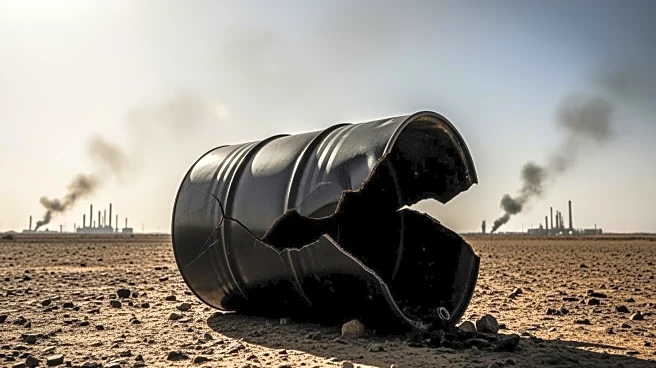What's Happening?
Ukraine has intensified its drone attacks on Russian oil infrastructure, resulting in a significant drop in Moscow's fossil fuel exports. In September, Russian fuel exports fell to their lowest level since
the beginning of the invasion of Ukraine, with an average of $637 million exported daily, marking a 4% decrease from August and a 26% decline from September 2024. Ukrainian President Volodymyr Zelensky has stated that these attacks are intended to act as effective sanctions against Russia. Recent drone strikes have targeted key oil facilities, including a terminal in Crimea and refineries in Primorsk and Kirishi, causing substantial damage and halting crude oil production.
Why It's Important?
The decline in Russian fossil fuel exports due to Ukraine's drone attacks has significant implications for global energy markets and geopolitical dynamics. Russia's oil infrastructure is crucial for funding its military operations, and the reduction in exports could weaken its economic position. Countries like China, India, Turkey, Hungary, and Slovakia, which are major importers of Russian fossil fuels, may face challenges in securing energy supplies. Additionally, President Trump's imposition of tariffs on Indian exports and his call for NATO members to cease purchasing Russian oil highlight the broader international efforts to isolate Russia economically.
What's Next?
The European Union is moving forward with a proposal to gradually ban pipeline and LNG imports from Russia starting January 1, 2026. This decision could further impact Russia's energy sector and its ability to sustain its military activities. The ongoing drone attacks by Ukraine are likely to continue, potentially leading to more disruptions in Russian oil production and exports. International stakeholders, including NATO and EU members, may increase pressure on Russia through economic sanctions and diplomatic measures.
Beyond the Headlines
The strategic use of drone technology by Ukraine underscores the evolving nature of modern warfare, where non-traditional methods can have substantial impacts on national economies and military capabilities. The ethical and legal implications of such attacks, particularly in terms of international law and civilian safety, may become a topic of discussion among global leaders and organizations.










